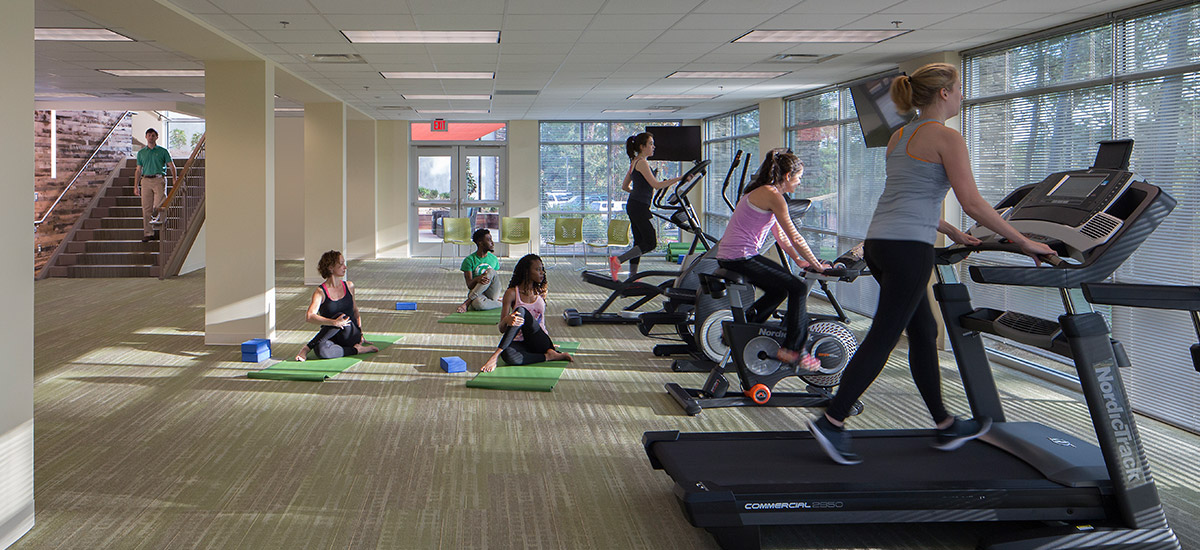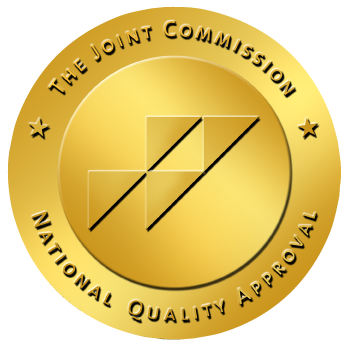Integrated Wellness Improves Mental Health and Physical Health
The Skyland Trail focus on integrated wellness ensures that clients have the education, treatment and care they need for healthy futures. The Glenn Family Wellness Clinic helps coordinate many of the pieces of that puzzle. Clients graduate from Skyland Trail residential treatment and day treatment programs with an understanding of the importance of caring for their health as well as the skills needed to protect and improve their health through healthy living and preventive care.

On-site Wellness Clinic
Our onsite primary care clinic is staffed by medical professionals with expertise in addressing the physical health needs of patients with mental illness. All clients receive an initial physical exam and continue to receive primary care services throughout their treatment, including:
- Initial medical history and physical exam
- Comprehensive laboratory screenings, including complete metabolic panels, complete blood counts, thyroid function tests, nutritional state checks, screenings for infectious and autoimmune diseases, required monitoring related to certain medications
- Urinalysis, including tests for alcohol and substances and possible infections
- Preventive services including safer sex counseling, genetic counseling, management of chronic diseases like diabetes and hypertension
As part of an initial clinic visit, clinic staff help patients develop a set of goals for their physical health, for example improving nutrition, increasing regular exercise, lowering blood pressure, reducing cholesterol, quitting nicotine use, or meeting preventive care recommendations like annual dentist visits, eye exams or disease screenings. These wellness goals are included in the patients’ treatment plans along with their goals for improved psychiatric health.
Throughout treatment, patients participate in routine wellness visits at the Clinic to receive help with ongoing health issues as well as education on disease prevention and long-term wellness. If specialized care is needed, the treatment team will help schedule appointments with third-party healthcare providers in the community and will arrange transportation if required.

Behavioral Health Home
Skyland Trail earned Behavioral Health Home Certification from The Joint Commission in 2018. The certification demonstrates Skyland Trail’s commitment to the integration and coordination of behavioral health care services and primary physical health services through a rigorous process of external validation by recognized experts in the field.
Healthy Eating & Active Living
Outside of the clinic, healthy living education and counseling are an important and integral part of clients' overall treatment plans. All clients meet individually with our nutrition and wellness counselor. Adult clients working toward independent living learn healthy living skills through cooking classes and other hands-on group activities. And physical activity like yoga, weight training, or team sports is a part of each daily schedule for adults and adolescents.

Healthy Challenge Program
In addition to our standard integrated wellness activities, some adult clients may choose to participate in our Healthy Challenge program, which is an extra level of education and support to reduce the risk of cardiometabolic syndrome.
Individuals with mental illnesses face particular risk for developing heart, pulmonary, and energy problems, collectively called "cardiometabolic syndrome." High Body Mass Index (BMI), hypercholesterolemia, hypertriglyceridemia, hypertension, and hyperglycemia are the components of this syndrome. Two classes of medications used to treat individuals with schizophrenia, bipolar disorder, and depression – atypical antipsychotics and mood stabilizers – are known to exacerbate the problem, as are a number of the correlates of severe mental illness including a sedentary lifestyle and social isolation.
Participating adult patients receive access to a personal trainer for weight control and to promote lean muscle mass. They also receive a low-carbohydrate, high-lean-protein meal plan; psycho-education about the link between physical and mental health; tobacco cessation tools; nutritional education; meditation and relaxation classes, including yoga. Medication treatment of insulin resistance and/or hyperglycemia is provided as indicated.
The majority of adult patients who complete the healthy challenge program experience several changes in their physical functioning including:
- a statistically significant decrease in in body mass index (BMI)
- a decrease in their total cholesterol
- a decrease in their triglycerides
Nicotine-Free Campus
Skyland Trail recognizes that smoking and the use of nicotine products is detrimental to the health and safety of everyone. This organization supports an environment where employees, patients, visitors, partners, and vendors are not exposed to the harmful effects of direct tobacco use or secondhand smoke and are supported in efforts to live nicotine- and tobacco-free. Skyland Trail is a 100% smoke- and nicotine- free campus.
The Nicotine-Free Campus prohibits all smoking, vaping and the use of all tobacco and nicotine products, except those approved for use in smoking cessation strategies.
If clinically indicated, clients are enrolled in the nicotine cessation program as part of their treatment. Clients receive support to quit using nicotine products, including peer support, education, and mindfulness groups; educational materials; support to obtain and use nicotine replacement products; and prescriptions for medications as indicated.
What does smoking or vaping have to do with mental health?
Helping patients quit smoking or stop using nicotine products is a critical component of promoting long-term health, preventing chronic disease, and ensuring that medications and interventions for psychiatric health are effective.
Ensuring a healthy future means being nicotine free. The most common causes of death among people with mental illness are heart disease, cancer, and lung disease, which can all be caused by smoking.
Nicotine affects mood. Nicotine has mood-altering effects that can temporarily mask the negative symptoms of mental illness. Nicotine may affect an accurate assessment of active symptoms.
Smoking affects psychosis. An increasing body of research indicates that daily tobacco use is associated with increased risk of psychosis and an earlier age at onset of psychotic illness.
Nicotine interacts with many psychiatric medications. Tobacco smoke can interact with and inhibit the effectiveness of certain medications taken by mental health and substance abuse patients.
Nicotine use by young adults may be particularly harmful. According to a 2016 Surgeon General’s report, “Compared with older adults, the brain of youth and young adults is more vulnerable to the negative consequences of nicotine exposure. The effects include addiction, priming for use of other addictive substances, reduced impulse control, deficits in attention and cognition, and mood disorders.”
